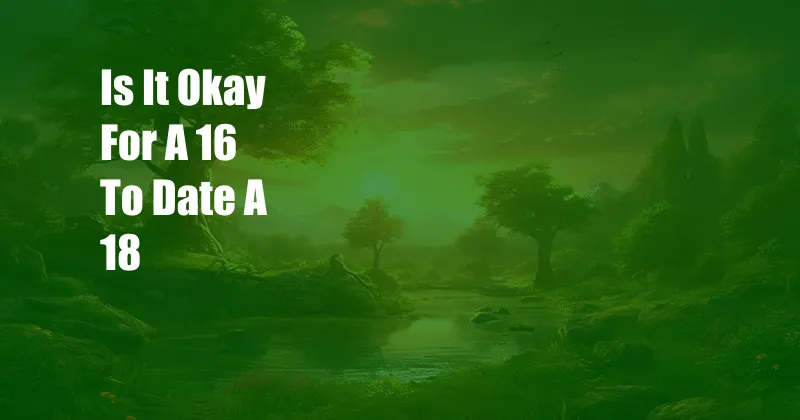
Is it Okay for a 16 to Date an 18-Year-Old?
The question of whether it’s appropriate for minors with a two-year age gap to engage in romantic relationships is a complex and delicate topic. Statutory laws regarding the age of consent vary across different countries and states, and there is no universal consensus on the matter. However, it’s crucial to consider the developmental, emotional, and social implications before making any judgments.
In this article, we will delve into the legal, ethical, and psychological aspects of this issue, examining both sides of the argument. We will also provide practical advice for parents, educators, and young people navigating this sensitive subject.
Legal Considerations
Legally, the age of consent, which refers to the age at which a person is considered legally capable of giving consent to sexual activity, varies from 16 to 18 in most jurisdictions. This means that in some places, a 16-year-old may be legally permitted to engage in sexual activities with an 18-year-old, while in others, it would be considered statutory rape.
However, it’s important to note that even in jurisdictions where such relationships are legal, there may still be social and ethical concerns to consider. Parents and educators should be aware of the potential risks and have open and honest conversations with young people about healthy relationships and consent.
Developmental and Emotional Factors
From a developmental perspective, there can be significant differences between 16 and 18-year-olds. Sixteen-year-olds are still minors and are going through significant physical, emotional, and cognitive changes. They may be more vulnerable to peer pressure and may not fully understand the implications of their actions.
On the other hand, 18-year-olds are legally adults and may have a better understanding of their own needs and desires. However, they are still young and may not have the maturity and experience to handle the complexities of a romantic relationship.
Social and Ethical Concerns
Societal norms and ethical considerations also play a role in this issue. In many cultures, there is a stigma attached to relationships with significant age gaps, especially when one party is a minor. This can lead to judgment and criticism from peers, family members, and the community.
Additionally, there is a concern that relationships with large age gaps may be inherently unequal and may involve an imbalance of power. The older partner may have more life experience and may be in a position of authority or influence over the younger partner.
Expert Advice
Based on research and experience, experts generally advise caution when it comes to relationships with significant age gaps involving minors. They recommend that parents and educators have open and honest conversations with young people about healthy relationships, consent, and the potential risks and benefits of such relationships.
They also emphasize the importance of setting clear boundaries and expectations, and of providing support and guidance to young people as they navigate the complexities of dating and relationships.
FAQ
A: The legality of such relationships varies by jurisdiction. In some places, it is legal, while in others, it is considered statutory rape.
A: Potential risks include developmental differences, power imbalances, and social stigma.
A: They should have open and honest conversations with the young person, set clear boundaries and expectations, and provide support and guidance.
Conclusion
The question of whether it’s appropriate for a 16 to date an 18-year-old is a complex one that requires a balanced consideration of legal, ethical, and developmental factors. While the legality of such relationships may vary, it’s important to prioritize the well-being and safety of young people.
It’s essential that parents, educators, and young people themselves have open and honest conversations about healthy relationships, consent, and the potential risks and benefits of relationships with age gaps.
By providing support, guidance, and clear boundaries, we can help young people make informed decisions and navigate the complexities of dating and relationships in a safe and healthy manner.
Do you have any experiences or thoughts on this topic?